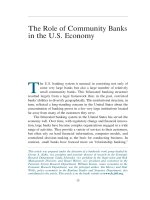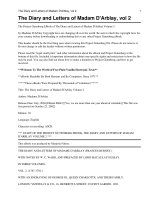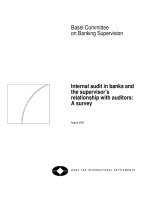On both banks of the jordan a political biography of wasfi al tall (volume 2)
Bạn đang xem bản rút gọn của tài liệu. Xem và tải ngay bản đầy đủ của tài liệu tại đây (20.23 MB, 227 trang )
ROUTLEDGE LIBRARY EDITIONS:
JORDAN
Volume 2
ON BOTH BANKS OF THE JORDAN
ON BOTH BANKS OF THE JORDAN
A Political Biography of Wasfi al-Tall
ASHER SUSSER
First published in 1994 by Frank Cass & Co. Ltd.
This edition first published in 2017
by Routledge
2 Park Square, Milton Park, Abingdon, Oxon OX14 4RN
and by Routledge
711 Third Avenue, New York, NY 10017
Routledge is an imprint of the Taylor & Francis Group, an informa business
© 1994 Asher Susser
All rights reserved. No part of this book may be reprinted or reproduced or utilised
in any form or by any electronic, mechanical, or other means, now known or
hereafter invented, including photocopying and recording, or in any information
storage or retrieval system, without permission in writing from the publishers.
Trademark notice: Product or corporate names may be trademarks or registered
trademarks, and are used only for identification and explanation without intent to
infringe.
British Library Cataloguing in Publication Data
A catalogue record for this book is available from the British Library
ISBN:
ISBN:
ISBN:
ISBN:
978-1-138-62955-4
978-1-315-20177-1
978-1-138-63467-1
978-1-315-20226-6
(Set)
(Set) (ebk)
(Volume 2) (hbk)
(Volume 2) (ebk)
Publisher’s Note
The publisher has gone to great lengths to ensure the quality of this reprint but
points out that some imperfections in the original copies may be apparent.
Disclaimer
The publisher has made every effort to trace copyright holders and would welcome
correspondence from those they have been unable to trace.
ON BOTH BANKS
OF THE JORDAN
A Political Biography of
Wasfi al-Tall
Asher Susser
FRANK CASS
First published in 1994 in Great Britain by
FRANK CASS & CO. LTD.
Newbury House, 900 Eastern Avenue,
Newbury Park, Ilford, Essex IG2 7HH
and in the United States of America by
FRANKCASS
c/o International Specialized Book Services, Inc.
5804 N.E. Hassalo Street
Portland, Oregon 97213-3644
Copyright© 1994 Asher Susser
British Library Cataloguing in Publication Data
Susser, Asher
On Both Banks of the Jordan: Political
Biography of Wasfi a!-Tall
I. Title
956.9504092
ISBN 0-7146-4542-7
Library of Congress Cataloging-in-Publication Data
Susser, Asher.
[Ben Yarden le-Falestin. English]
On both banks of the Jordan : a political biography of Wasfi a!
-Tall I Asher Susser.
p.
em.
Includes bibliographical references and index.
ISBN 0-7146-4542-7
1. Tall, Wasfi, 1919-1971.2. Prime ministers-Jordan-Biography.
3. Jordan-Politics and government. 4. Palestinian Arabs-Politics
and government. 5. Muna~~amat al-Tal)rir al-Filasttnlyah.
I. Title.
DS154.52. T34S8713 1994
956.9504'3'092-dcZO
[B]
93-10856
CIP
All rights reserved. No part of this publication may be reproduced in any
form or by any means, electronic, mechanical, photocopying, recording
or otherwise, without the prior permission of Frank Cass and
Company Limited.
Typeset by Vitaset, Paddock Wood, Kent
Printed in Great Britain by Bookcraft (Bath) Ltd
Contents
List of Illustrations
vn
Preface
ix
Introduction: The Jordanian Regime and
the Palestinians
1. Wasfi al-Tall- The Early Years
1
9
2. The Beginning of a Political Career (1945-49)
The 'Arab Offices'
The Army of Salvation (Jaysh al-Inqadh)
Lessons of the 1948 war
14
14
15
19
3. Jordanian Government Service (1949-61)
Senior civil servant
The spokesman for the regime
The propaganda war against Eygpt
Relations with Iraq
Jordan's ambassador in Baghdad
Anti-Nasserist plots in Lebanon
23
23
29
30
32
33
34
4. Prime Minister (1962-63)
The appointment
Purging the bureaucracy
The Amnesty Law
Elections under controlled liberalization
Jordan's initiative on Palestine
Confrontation with ~ Abd al-Nasir
Support for the royalist cause in Yemen
A new government: increasing domestic opposition
The Ba ~thi coups in Iraq and SyriaHusayn back on the defensive
36
36
39
41
42
47
53
57
59
5. Confrontation with the PLO (1965-67)
Back to the Prime Minister's office
The merits of political indoctrination
Shura but no more
70
70
72
73
65
The General Amnesty
The price of the 'summit spirit'
The challenge of the PLO
Tall and Shuqayri- negotiations between rivals
Peparations to thwart the PLO
Fruitless attempts at compromise
The March 1966 agreement
The suppression of the oppositon and
popular PLO support
Mounting tension with the PLO
Crisis and rupture
Tall's assault on 'Shuqayri's PLO'
The disintegration of the 'summit spirit'
The impact of the Samu' operation
Opposition within the establishment
Jordan's counter-offensive
75
76
78
82
84
87
93
94
96
99
102
103
109
117
119
6. Behind the Scenes (1967-70)
Tall and the Six Day War
The arch-enemy of the Fida'iyyun
'Black September'
123
123
132
137
7. The Final Eviction of the Fida'iyyun (1970-71)
Tall, the Fida'iyyun and the question of
'law and order'
Relentless pressure
The final expulsion
Political rehabilitation of the Kingdom
Tall and the future of the West Bank
Between Tall and Husayn
The assassination in Cairo
141
141
145
150
156
160
163
168
Conclusion: Wasfi al-Tall and the East Bank Political Elite 172
Notes
182
Bibliography
196
Index
204
List of Illustrations
Between pages 90 and 91
1 Wasfi al-Tall at the High School in Salt.
2 Wasfi al-Tall with his wife Sa'diyya.
3 Wasfi al-Tall as Director of Jordanian
Radio.
4 Tall sets fire to domestic intelligence
dossiers.
5 Wasfial-TallandKingHusayn.
6 Wasfi al-Tall's final return to Cairo.
Picture credits
All photographs are taken from Wasfi al- Tall: An Illustrated Record
by Isam Arida (1972) and reproduced by courtesy of the Jordan
Press Foundation.
vii
Preface
More than any other single issue, Jordan's complex and often
contentious relations with Palestine and the Palestinians have
shaped the historical development of the Hashimite Kingdom.
Perhaps more than any other individual, with the exception of
King 'Abdallah, the founder of the Kingdom, and his grandson,
King Husayn, it was the East Bank politician and statesman, Wasfi
al-Tall, who personified Jordan's determination to preserve its
political and territorial integrity.
No Jordanian, outside the Hashimite royal family, has ever
embodied the Jordanian state and its struggle for survival with
greater resolve and power than Wasfi al-Tall. All the fundamental
characteristics of the Kingdom became integral components of
Tall's political consciousness. During his rather brief political
career, cut short by the bullets of assassins, he matured into one
of the most representative examples of those East Bankers who
compose the Jordanian political elite, the backbone and mainstay
of the Hashimite regime.
Wasfi al-Tall was one of King Husayn's closest confidants and one
of Jordan's senior statesmen from the early 1960s until the early
1970s. During this period he served three terms as prime minister,
all at decisive junctures in the unfolding competition and confrontation between Jordan and the Palestinian national movement. It
was in the last of these terms of office, in 1970-71, that he orchestrated the expulsion of the PLO from Jordan. Ironically, Tall's
political career, which began in the 1940s, when he devoted himself
to the Arab political and military struggle in Palestine, was abruptly
terminated when he was gunned down by Palestinians, who condemned him as the architect of their defeat in Jordan.
Writing the political biography of a Jordanian politician while
unable to visit Jordan to interview those who worked closely with
him has its obvious drawbacks. I have tried to compensate with
interviews with the late Anwar Nusayba and two former US
ambassadors to Jordan, Findley Burns and William Macomber, to
all of whom I remain particularly grateful for their co-operation.
My main sources, however, came from the wealth of available
written material: Tall's own writings, speeches, interviews and
lX
A POLITICAL BIOGRAPHY OF WASFI AL-TALL
press conferences; Jordanian and other Arab press articles and
broadcasts covering Tall's entire career; and secondary sources on
Jordan published in Jordan and elsewhere.
Much of this study was originally published in Hebrew (a first
edition in 1983 and a second in 1986). This English version has
been revised in places, following the publication of some new
source material. It differs from the Hebrew edition in two main
respects. The first chapter, 'The Early Years', has been partly
rewritten in view of the publication in Jordan of a collection of
biographies by Sulayman Musa which included new material on
Tall's childhood and youth that had hitherto been unavailable to
me. I have also written a new concluding chapter on the Jordanian
political elite which did not appear in the Hebrew book.
To quote my fri~nd and colleague, Dr Martin Kramer, 'when
done with sensitivity, the telling and reading of lives increase our
empathy for people of other times, other places, other cultures'
(Martin Kramer (ed.), Middle Eastern Lives: The Practice of
Biography and Self-Narrative (Syracuse University Press, 1991),
p. 19). I do sincerely hope that this book meets these criteria.
There are many to whom I owe a debt of gratitude and without
whose help this book would never have been completed. I am
especially grateful to the late Professor Uriel Dann and to Mr Daniel
Dishon who read the manuscript of the English version and made
most valuable suggestions. I am similarly most grateful to my parents,
Gideon and Minnie, for their painstaking assistance in preparing
the initial draft of the English translation. For 20 years my academic
home has been the Moshe Dayan Center and Shiloah Institute at
Tel Aviv University. It is to that institution and its fellows, and
particularly to its former head, Professor !tamar Rabinovich, that I
owe an extraordinary debt of gratitude for friendship, inspiration,
co-operation and material support. Edna Liftman and Amira
Margalith, who turn the wheels of publication and office administration, were as indispensable as always. Lydia Gareh, who typed
the manuscript with painstaking precision, has become an institution
in her own right in the eyes of all who have ever had the pleasure of
working with her. Last, but not least, I want to thank by wife
Miriam and my two sons, Boaz and Eyal, who have lent a special
sense of purpose to the demands of academia.
Asher Susser
Tel Aviv, May 1993
X
Introduction: The Jordanian Regime
and the Palestinians
For centuries inhabitants of the East and West Banks of the River
Jordan have been linked by bonds of kinship and economic interaction and, at times, by administrative and political ties as well.
The British Mandate for Palestine initially included both banks,
and the British authorities noted, with considerable historical
justification, that for economic reasons as well as in some geographical aspects the two areas were essentially one unit. 1
In 1921 the Emirate of Trans-Jordan was established to serve
both British imperial interests and Hashimite dynastic ambitions.
Henceforth, Trans-Jordan developed as a separate political unit.
Nevertheless, Trans-Jordan remained part of the British Mandate
for Palestine, until it achieved independence, as the Hashimite
Kingdom of Jordan, in 1946. Jordan's political fate continued to
be intimately connected to that of Palestine. King 'Abdallah, the
grandfather of King Husayn and the founder of Hashimite TransJordan, never concealed his political aspirations in respect of
Palestine. He regarded the establishment of an independent Arab
state in Palestine as a potential threat to his throne and therefore
sought to ensure Hashimite supremacy in the settlement of the
Palestinian question. Jordan's occupation of the West Bank in
1948 and the formal annexation of the territory in 1950 forestalled
the immediate threat to the Kingdom, but did not suffice to
overcome the deep-seated hostility which many Palestinians felt
for the Hashimite regime. From the outset, the relationship between
the regime and the large Palestinian population that was absorbed
into the Kingdom was characterized by considerable tension and
repeated political confrontations. At times, the regime's very
existence was endangered. Yet, despite the challenge, the Jordanian
political entity remained stable, consistently defined by the following characteristics:
• A Kingdom, hereditary in the Hashimite family, successor to
the British-mandated Emirate of Trans-Jordan, and heir, as far
as possible, to its political, social and psychological values. The
1
A POLITICAL BIOGRAPHY OF WASFI AL-TALL
•
•
•
•
King is the linchpin of the political system and the real head of
the decision-making process.
The monarchy is backed by a political elite which is predominantly Trans-Jordanian. This elite is supportive of the
status quo and is. apprehensive of any change that may deny it
access to, and control of, the key positions of state, government
and army. Power resides disproportionately with East Bankers.
Palestinian influence has never been commensurate with their
demographic weight.
The regime relies heavily on the army and other security forces.
These are employed against the opponents of the regime, upon
the King's instructions, whenever he perceives it to be in serious
danger. It should be noted, however, that King Husayn does not
relish the use of force against his subjects, and tends to do so
only in extreme situations.
The regime is fearful of any radical ideology- Nasserist, Ba'thi
or Communist on the one hand, or revolutionary Islamic on the
other. It treats all who show any sympathy for these ideological
trends with suspicion, and it does not hesitate to confront them,
at times even resorting to force.
Jordan has always been connected with the West, first to Britain
and later to the United States, from which it has received much
of the political, economic and military assistance that has been
essential for the Kingdom's survival. 2
In its attitude to the regime, the political public was traditionally
divided into two fairly clearly defined groups: the supporters of the
existing political structure, namely, the ruling political elite, composed in the main of Trans-Jordanians, supported by a Palestinian
minority; and its opponents, among whom Palestinians have always
figured prominently, backed by a minority of Trans-J ordanians.
Palestinians probably constitute just over half of the population
of the East Bank of Jordan and some two-thirds of the population
in both Banks combined. 3 A large proportion of this Palestinian
political public rejected the traditional 'image of Jordan' as defined
above and strove for radical change. They objected to the centrality of the monarchy and opposed the supremacy of the TransJordanian elite. They also rejected the regime's traditional alliance
with the Western powers, on whose shoulders the Palestinians
2
INTRODUCTION
tended to place much of the responsibility for their national
calamity in 1948. Most of the Palestinian political elite identified
with, and drew revolutionary inspiration from, precisely those
ideological trends that were anathema to the regime.
The role of the Palestinians in the upper echelons of the
government and the military has always been marginal. Even so, a
not insignificant number of Palestinians threw in their political and
personal lot with the regime, and displayed unswerving loyalty to
the throne, even in times of crisis between the regime and the
Palestinian population.
Some of the Palestinians who supported the regime originated
from the N ashashibi camp in Palestinian politics, which formed
during the years of the British Mandate. They maintained strong
ties with the Amir (later King), 'Abdallah. The N ashashibis and
'Abdallah chose to join forces against their mutual enemy, Hajj
Amin al-Husayni, then leader of the Palestinian national
movement. Others had economic interests which they wished to
safeguard by links with the establishment. Yet another group was
composed of those whose support for the monarchy stemmed from
their loyalty to government per se, and from a realistic appraisal of
the balance of forces in Jordan. They did not believe that there Was
a reasonable chance of change and therefore preferred not to pay
the price of sterile opposition. One cannot ignore those who chose
to co-operate with the regime for reasons such as the aspiration for
status, prestige and authority, or other personal rewards. On the
other hand, there were also Palestinians who genuinely identified
with the regime's pragmatic and relatively moderate policies on the
struggle with Israel, in inter-Arab affairs and the economy.
From among East Bankers who have traditionally filled key
positions, southerners of tribal Bedouin origin have often been preferred to urban northerners. Since the earliest days of'Abdallah's
rule, northerners, from the towns of Irbid and Salt, have been at
the core of the Trans-Jordanian opposition.
The Bedouin have played a central role in the Jordanian establishment. From the outset, most of their chieftains were closely
associated with 'Abdallah, who cultivated a special relationship
with the Bedouin, and since their recruitment to the Arab Legion
in the 1930s the Bedouin have been the backbone of the crack
fighting units of the army, the mainstay of the regime. The number
3
A POLITICAL BIOGRAPHY OF WASFI AL-TALL
of nomadic or semi-nomadic Bedouin has been steadily declining
for many years. In 1960, they accounted for less than ten per cent of
the East Bank population, 4 and by 1980 their number had dwindled
further, to some five to seven per cent of an East Bank population
of well over two million. 5 Today, that figure is even smaller, in a
population that exceeds three million.
The proportion of nomadic, semi-nomadic and recently sedentarized Bedouin in the army, particularly in key units, far exceeds
their relative weight in the overall population. Their devotion to
the Hashimite monarchy rests to a large degree on the unique
status of the King. He has become the focus of a supra-tribal
loyalty, which, to a certain extent, has replaced the traditional
more circumscribed tribal solidarity. This special relationship has
engendered a remarkable and almost complete identification of
the army with the regime.
The Jordanian army, contrary to a number of other Arab
armies, developed as a relatively apolitical and professional military
machine that has suffered only marginally from subversion. There
have been isolated attempted coups but these never seriously
eroded its loyalty. It has been employed on various occasions by
the King against his domestic enemies. The army's reputation for
unswerving loyalty to the regime has also probably deterred many
would-be plotters. The causes for the army's exemplary loyalty are
not related solely to the fact that it is based on the Bedouin nucleus,
but also to the systematic cultivation of its esprit de corps; longterm service under relatively good material conditions; good leadership from the throne downwards; and the fear of the officer class
for its position under a regime rejecting the 'image of Jordan'. 6
In recent decades social change and modernization had had a
far-reaching impact on the Bedouin. The process of sedentarization and the influence of education and communications have
reduced the level of tribal awareness and identity. Moreover, since
the institution of conscription in 1976, the relative weight of the
Bedouin in the army has declined. 7 These factors might eventually
have a negative effect on army loyalty. At present, however, there
-are no indications that the army has undergone significant change
in this respect.
Many of the conscripts, as opposed to career recruits, are placed
in service jobs and most do not remain in the army after their two
4
INTRODUCTION
years of duty are up. 8 The Bedouin, on the other hand, are still
largely inclined to seek career fulfilment in the military ,9 and, as a
result, the fighting units and the officer corps are still
disproportionately Bedouin. Available evidence even suggests
that the weakening of tribal solidarity and the diminishing
authority of tribal shaykhs has actually tended to reinforce the
King's role of 'shaykh of shaykhs'. Modernization and change have
thus promoted a more direct identification of the individual with
the Jordanian nation-state, which is replacing the traditional
identification through the collective tribal association with the
regime. 10 The bond between the Bedouin troops and the King,
therefore, is still very strong. 11
The political leadership, with the King at the centre of the
decision-making process, is composed of a very small number of
senior officials and members of the royal family. It includes only
some members of the cabinet, usually the Prime Minister, the
Minister of the Interior (responsible for domestic security), and
the Minister of Information. As opposed to the situation obtaining
in many Western countries, the role of the Foreign Minister is, for
the most part, restricted to the execution of policy laid down by the
King and to the supervision of the diplomatic corps. The authority
of the Minister of Defence is similarly confined and his role is
limited, in the main, to administrative matters; the formulation of
policy is the exclusive domain of the King and his inner group.
Since the annexation of the West Bank, there have always been
Palestinians in Jordanian cabinets. Until Jordan's disengagement
from the West Bank in 1988, usually about half of the ministers in
any given cabinet were of Palestinian extraction. At times, some
were entrusted with the portfolios of Defence and Foreign Affairs.
However, it is only in rare instances that they have held those
portfolios which entail membership of the restricted decisionmaking group at the very top.
Generally, the most senior officers in the defence establishment
are associated with this inner group, including the most senior
army officers and the directors of the domestic security forces General Intelligence (the internal security service) and General
Security (the police). None of these positions has ever been held by
a Palestinian.
Outside the functional categories, there is a circle of 'King's
5
A POLITICAL BIOGRAPHY OF WASFI AL-TALL
friends' who may or may not hold official appointments, but who
have the King's ear and who are regularly entrusted with missions
of political importance. 12 This circle would normally include
various members of the royal family, such as the King's younger
brother, Crown Prince Hasan, and, in Husayn's earlier years, the
Queen Mother and some of Husayn's uncles; the Chief of the
Royal Court; one or two very close personal advisers; and a select
few of former senior officials.
Husayn selects the members of his inner council and those who
fill important positions according to their personalities and
political proclivities in order to facilitate the satisfactory execution
of policy, as formulated by him, at any particular juncture. Policy is
determined in the palace and not by the cabinet, which is chiefly
concerned with its execution and its explanation at home and
abroad. But it is the cabinet which is far more exposed to public
scrutiny than the palace. Consequently it is the cabinet which
invariably attracts criticism for a policy in fact laid down by the
King. Changes in government in response to such criticism serve as
a mechanism designed to protect the King. They occur frequently,
particularly in times of stress, but do not necessarily herald any
change in policy. However, they do tend to create the impression
of impending change, thus acting as a most important 'shock
absorber' in times of crisis.
Any opposition whose objective is to obtain a meaningful share
in political power, let alone assume power, in order to change the
traditional image of the Kingdom is perceived by the regime as a
form of subversion and thus not tolerated. This does not mean that
the opposition is completely deprived of any freedom of action.
The measure of freedom it is allowed is a function of the King's
self-confidence and the risk he is prepared to take at any given
time. In recent years Jordan has undergone a process of
liberalization. However, the regime has never had the intention of
permitting the opposition to have real influence on the decisionmaking process.
The Jordanian parliament (Majlis al-Umma) is bi-cameral.
Until Jordan's disengagement from the West Bank, the Senate
(Majlis al-A 'yan) had 30 members appointed by the King from
among the notables, former prime ministers, ministers and ambassadors; and an elected Chamber of Deputies (Majlis al-Nuwwab)
6
INTRODUCTION
which had 60 members, equally divided between East Bank and
West Bank constituencies. Following the disengagement, membership of the Senate was increased by ten and the Chamber of
Deputies by 20 members, representing constituencies solely from
the East Bank. The constitution requires that they be elected for a
period of four years, in regional, secret and direct general elections.
The appointed Senate tends to ensure that a certain skein of
conservatism is woven into the fabric of the legislature. 13 Moreover, until quite recently, the regime resorted to a number of other
measures to guarantee that parliament was not transformed into a
vehicle of the opposition. The existence of political parties in
Jordan was forbidden, and elections were therefore held on a
personal basis. In spite of the fact that the constitution requires
that elections should be free, they were generally 'directed' by the
government, with the object of minimizing the representation of
the opposition. Candidates considered undesirable by the government were sometimes prevented from running in the elections by
various forms of pressure brought to bear upon them by the
domestic security apparatus. In order to ensure the success of its
favoured candidates, the regime also often adopted a variety of
fraudulent procedures in the voting and in the counting of votes.
The antagonism prevalent between a large segment of the
Palestinian political public and the Hashimite regime made it a
constant facet of Jordanian policy to limit Palestinian attempts to
attain key positions; moreover, the government deprived them
of the ability to organize any political power-base which would be
independent of the central government. One of the essential
elements of this policy was the attempt by the Hashimite regime to
assimilate the Palestinians into the Jordanian state by systematically de-emphasizing their Palestinian identity, so as to transform
them into loyal Jordanian subjects. This, however, was diametrically opposed to autonomous Palestinian efforts to maintain their
national identity and to the general Arab consensus on this issue.
The predominant trend in the Arab world was to preserve the
Palestinian identity and to allow for its organizational expression
through the notion of a 'Palestinian entity' (kiyan Filastini). It was
the coalescence of this Palestinian effort and the Arab consensus
that spurred the formation of the Palestine Liberation Organization
(PLO) in 1964.
7
A POLITICAL BIOGRAPHY OF WASFI AL-TALL
Before the establishment of the PLO, the Palestinian opposition
in Jordan expressed itself through the medium of various radical
political parties until these were banned in 1957. Indeed, the
Palestinians were the backbone of a variety of opposition parties
all subscribing to a revolutionary social and political platform.
On the left, these were the Ba'th, the Communists, the Arab
Nationalist Movement (Harakat al-Qawmiyyin al- 'Arab), and the
less radical National Socialist Party led by Sulayman al-Nabulsi; on
the right (a term chosen for convenience rather than accuracy)
there were the religious-fundamentalists organized in the Muslim
Brotherhood and the Islamic Liberation Party. All these groups
rejected the traditional image of Jordan in one way or another. In
October 1956, as a result of elections that were freer than usual,
opposition candidates won a majority in the Chamber of Deputies.
Nabulsi formed a government which soon threatened to overturn
the traditional political order. Husayn, aware of the danger, bided
his time for a while, but then, in April 1957, cracked down and
smashed the opposition. He dismissed the Nabulsi government,
imposed martial law and banned all political parties. 14
The formation of the PLO threatened yet again to provide the
Palestinians with a framework for political organization against the
government. Like the parties of the 1950s, it presented the regime
with a political challenge, only now the threat was even greater.
The PLO purported to provide a political framework potentially
appealing to the majority of the population in a manner liable to
threaten the very existence of the Jordanian state far more directly
and more seriously than any of the banned parties had done.
In the annals of the Jordanian-Palestinian confrontation, one
could hardly point to a more outstanding Jordanian personality
than Wasfi al-Tall. Tall's entire political career was interwoven
from beginning to end with the Palestinian saga and the impact it
had on Jordan.
8
1
Wasfi al-Tall- The Early Years
Wasfi al-Tall was born in 1919 and grew up in Irbid in northern
Jordan. The family has its origins in the Bani Zaydan tribe which
migrated from the Najd region in Arabia to Syria in the middle of
the eighteenth century. Some members of the tribe settled in the
Irbid area while others chose the area of Zabdani in south-western
Syria. 1 The Tails became one of the most distinguished families in
Trans-Jordan and some of them rose to positions of prominence
even during Ottoman times, well before the founding of the
Emirate of Trans-Jordan in the early 1920s. 2 The first to achieve
real fame, or rather in this case notoriety, was Wasfi al-Tall's
cousin 'Abdallah al-Tall. He was a battalion commander in the
Jordanian army and military governor ofthe Old City of Jerusalem
in 1948. 'Abdallah al-Tall was sentenced to death in absentia for his
part in the assassination of King 'Abdallah in 1951. During Wasfi
al-Tall's second term as prime minister, at the beginning of 1965,
'Abdallah was pardoned and allowed to return to Jordan from his
extended exile in Cairo.
Wasfi al-Tall was the son of Mustafa Wahbi al-Tall, a wellknown Jordanian poet who had not always been favourably
disposed towards the Hashimite regime. Wasfi's mother was a
Kurdish woman whom his father had married during a sojourn in
'Arabkir (Arapkir, in present-day Turkish Kurdistan). Mustafa
W ahbi was caught up there on his way to university in Istanbul
during the First World War. Wasfi al-Tall was born in' Arabkir and
it was there. that he spent his early childhood, until his family
resettled in Irbid in 1924. 3 Wasfi was tall and had a dark complexion
inherited from his Tall forefathers and from his Kurdish mother.
He always looked younger than his years. Even when he reached
the age of 50, his thick jet-black hair gave him the appearance of a
younger man. His sharp and stern facial features corresponded
with his character which was essentially serious, strict and tough.
9
A POLITICAL BIOGRAPHY OF WASFI AL-TALL
But people who knew him well maintained that these features
belied some of his more humane and gentle traits. He had a fine
sense of humour, a deep affection for his friends and a romantic
streak, attested to by his love of nature, his profound appreciation
for the desert poetry of the Bedouin and for the traditions of village
life, which he cherished. As a mature politician, Tall was the
image of self-confidence and he was prone to demonstrations of
arrogance and disdain towards his opponents. But even when in
high office he did not find it unbecoming to work very long hours
and to take simple meals of bread and laban, falafil or humus,
sitting on the floor like the Bedouin and the villagers. 4
As a young boy Wasfi al-Tall was obstreperous, aggressive and
mischievous and it was already apparent in his early youth that he
had a mind of his own. He received his elementary education in
Irbid and in 1936 he enrolled at the high school in Salt, which was
the only government high school in Trans-Jordan in those days. 5
These were the beginnings not only of his formal education but of
his political schooling as well. He and his classmates came under
the influence of their history teacher, Sa'id al-Durra, who inspired
in them a powerful sense of identification with the Arab nationalist
cause. Tall and some of his peers became so emotionally involved
with the Arab cause in Palestine that they decided to form a secret
society called 'The Black Hand'. 6 These were the years of the Arab
Rebellion in Palestine and one of the most prominent groups
responsible for the promotion of the armed rebellion was 'The
Black Hand', led by the legendary Shaykh 'Izz al-Din al-Qassam.
Qassam was killed in a clash with the British in 1935, 7 and one may
assume that Wasfi and his friends had Qassam in mind when
choosing the name of their society. Theirs was but a youthful and
quite innocuous adventure. But they did succeed in getting
themselves into serious trouble. One night in order to register their
protest against their own government's moderation and restraint
on the Palestine question, they packed an old bombshell with
explosives and tossed it at the home of the local Mutasarrif( district
governor). They were immediately arrested, but Wasfi's father
intervened on their behalf and bailed them out. 8
Tall graduated from high school in 1938 and went to Lebanon
to pursue his university education at the American University in
Beirut (AUB). The AUB was then the most distinguished insti10
THE EARLY YEARS
tution of its kind in the Arab world. It was the intellectual hub for
the educated young of the most respectable families from a number
of Arab countries and, as such, became the training ground for
numerous Arab leaders of the future. The three years he spent at
the AUB were an educational and political inspiration to Wasfi alTall, as he entered his twenties.
He came into contact with students from all over the Arab world
in a highly politicized college atmosphere. The ideas of Arab
nationalism were expounded to them by some of the leading Arab
intellectuals. The most prominent of these at the AUB was
Qustantin Zurayq, a distinguished medieval historian and, as
Albert Hourani has put it, a 'consulting don to a whole generation
of nationalists' .9 It was around the likes of Zurayq that the nucleus
of what was later to become the Arab Nationalist Movement was
formed in the late 1930s and early 1940s, when Zurayq published
some of his most important works on Arab national consciousness.
When British forces intervened in Iraq, in early 1941, to put
down the pro-Axis Rashid 'Ali movement, many students at the
A UB, including Wasfi al-Tall, staged demonstrations in support of
Rashid 'Ali. Tall and others, fired with enthusiasm for the Arab
nationalist cause, volunteered to fight for Rashid 'Ali and left
Beirut for Baghdad. However, they turned back before reaching
their destination when they heard the news of Rashid 'Ali's
defeat. 10
Wasfi al-Tall studied physics, chemistry and philosophy, but it
was for the last of these that he developed a real passion. The Arab
nationalists with whom Tall was associated at the time had initially
been influenced by European fascist thought. Tall became an
admirer of German philosophy, particularly Nietzsche's theories
on power .11 He was convinced that societies and nations had no life
without the acquisition of power and that work and power were the
very essence of existence. The idea of power, he contended (in an
essay he wrote in his final year at the AUB), was associated with
Islam fro111 its very beginning. The object of Islamic teachings, he
wrote, was to make the individual strong in his beliefs and in his
spirit, and powerful in his relations with others, and thus to ready
him for struggle. 12 Tall's acquaintance with Nietzsche's philosophy
was to have a lasting impact.
His student days at the AUB turned Tall into an avid reader.
11
A POLITICAL BIOGRAPHY OF WASFI AL-TALL
Most of his reading was on politics, philosophy and history,
particularly military history. His library included Plato's Republic,
the philosophy of Nietzsche, books on the history of the Roman
Empire and numerous works on war, especially the Second World
War and the memoirs of the great leaders who fought it. But there
were other interests too, like the novels of Lawrence Durrell and
books about animals, for which he had an especially soft spot. 13
Wasfi graduated from the AUBin 1941 and returned to TransJordan. He taught very briefly at a school in the southern town of
Karak before being transferred to his alma mater in Salt. He taught
chemistry, but he was far too much of a political being to confine
his classes to the subject at hand. Instead, they often drifted into
political sessions on the threat of Zionism to the Arabs and the
need for Arab unity. 14
In the summer of 1942 Wasfi's father was appointed to the
position of Mutasarrif of Salt. However, he soon fell out with the
Prime Minister, Tawfiq Abu al-Huda: after having deliberately
and provocatively challenged Abu al-Huda's authority, Mustafa
Wahbi al-Tall found himself in prison. Wasfi was outraged. He
sought an interview with the Prime Minister, but Abu al-Huda
refused to see him. In the corridor outside the Prime Minister's
office, Wasfi launched into a tirade of curses and abuse, which
could not but have been overheard by the Prime Minister. Having
lost his temper, Wasfi now lost his job as well. Abu al-Huda had
Wasfi join his father in prison where they spent the next three
months together .15
Having served a prison sentence, a return to teaching was out of
the question. The moment had come for a new departure. He tried
to join the Arab Legion, but was turned down by Glubb Pasha- it
was said on account of the fact that he was a university graduate. 16
In late 1942, the tides of war in the Middle East began to change in
favour of the Allies. The anti-British and pro-German mood that
had prevailed in much of the Arab world in the early years of the
Second World War (and which had not passed over Wasfi al-Tall
himself during his studies in Beirut) was beginning to subside. At
the end of 1942, Wasfi al-Tall decided to enlist in the British Army.
One cannot dismiss the notion that he enlisted for reasons similar
to those which, at least to some extent, had motivated the Jews
of Palestine to join the British Army - that is, to obtain military
12









